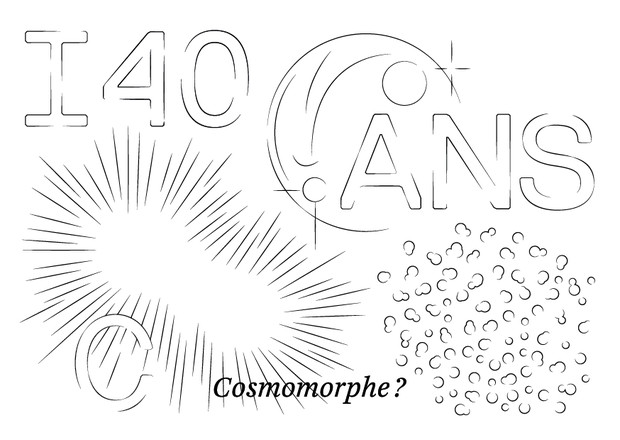From the creation of the Nouveau Musée in 1978, to its merging with FRAC Rhône-Alpes in 1998, to the birth of the Institut d’art contemporain, the IAC has distinguished itself as one of the pioneering structures for contemporary art in France.
On the occasion of its fortieth anniversary, beyond festivities or an overview, this autumn the IAC is presenting a snapshot of its activities – exhibitions, collection, emerging creation, talks – within the very dynamic of experimentation and research. In a time of accelerated transformations, the IAC is reaffirming its original dimension as a laboratory now more than ever, supporting artists and researchers of all kinds.
On the occasion of its fortieth anniversary, beyond festivities or an overview, this autumn the IAC is presenting a snapshot of its activities – exhibitions, collection, emerging creation, talks – within the very dynamic of experimentation and research. In a time of accelerated transformations, the IAC is reaffirming its original dimension as a laboratory now more than ever, supporting artists and researchers of all kinds.
All of the projects this autumn thus echo the research undertaken by the Laboratoire espace cerveau. The upheavals marking the Anthropocene* are obliging humans to imagine the world differently – firstly, by overcoming our anthropocentric perspective. Becoming aware of our part in natural cycles and recomposing a world in coexistence with all the creatures of the cosmos constitutes the initial phase towards a cosmomorphic world.
Sensitive to the atmosphere that contains them, Katinka Bock’s works defy the limits between interior and exterior and generate uncontrolled physical evolutions through their porosity.
Equally as attentive to this molecular dimension of matter, Théo Massoulier (Galeries Nomades 2018) seeks, through his composite sculptures, the potential continuums between the inert and the living, the organic and the synthetic.
According to the constitutive repertoire of his practice, the balls and eyes that Jean-Luc Parant sculpts out of clay (Collection à l’étude [Collection Revisited], Parcours d’art contemporain à Villeurbanne) make up a cosmic corpus, an elliptical cosmogony whose “overflowing” quality expresses what is unrepresentable about the universe. Playing on the same impossibility of transcribing the vastness of space, Observables d’Apeiron, a monumental length of silk by Célia Gondol (Collection à l’étude [Collection Revisited], Chaosmose) unfolds an undulating galaxy with infinite chromatic and graphical variations.
Finally, presented within the urban fabric of Villeurbanne, posters by Lawrence Weiner proclaim:
“MOI + TOI & NOUS” [ME + YOU & US].
This syntax created by the artist formulates a world of variable individualities – all different and yet remaining interconnected.
Cosmomorph?
In a cosmomorphic world, every creature belongs to a network of multiple relations, in which duality does not exist, and in which there is no separation from nature. Originally, the term “cosmomorph” was introduced by the anthropologist Maurice Leenhardt, who studied animist Melanesian societies in which creatures are attributed different statuses than they are in the West. Philosopher Pierre Montebello reactivated the term in 2015 with the book Métaphysiques cosmomorphes (published by the presses du réel), in which he questioned the relationship of beings between themselves, their relationship to the cosmos, and the need for consistency.
Nathalie Ergino
*A period marked by the global consequences of human activity on the biosphere
Sensitive to the atmosphere that contains them, Katinka Bock’s works defy the limits between interior and exterior and generate uncontrolled physical evolutions through their porosity.
Equally as attentive to this molecular dimension of matter, Théo Massoulier (Galeries Nomades 2018) seeks, through his composite sculptures, the potential continuums between the inert and the living, the organic and the synthetic.
According to the constitutive repertoire of his practice, the balls and eyes that Jean-Luc Parant sculpts out of clay (Collection à l’étude [Collection Revisited], Parcours d’art contemporain à Villeurbanne) make up a cosmic corpus, an elliptical cosmogony whose “overflowing” quality expresses what is unrepresentable about the universe. Playing on the same impossibility of transcribing the vastness of space, Observables d’Apeiron, a monumental length of silk by Célia Gondol (Collection à l’étude [Collection Revisited], Chaosmose) unfolds an undulating galaxy with infinite chromatic and graphical variations.
Finally, presented within the urban fabric of Villeurbanne, posters by Lawrence Weiner proclaim:
“MOI + TOI & NOUS” [ME + YOU & US].
This syntax created by the artist formulates a world of variable individualities – all different and yet remaining interconnected.
Cosmomorph?
In a cosmomorphic world, every creature belongs to a network of multiple relations, in which duality does not exist, and in which there is no separation from nature. Originally, the term “cosmomorph” was introduced by the anthropologist Maurice Leenhardt, who studied animist Melanesian societies in which creatures are attributed different statuses than they are in the West. Philosopher Pierre Montebello reactivated the term in 2015 with the book Métaphysiques cosmomorphes (published by the presses du réel), in which he questioned the relationship of beings between themselves, their relationship to the cosmos, and the need for consistency.
Nathalie Ergino
*A period marked by the global consequences of human activity on the biosphere


